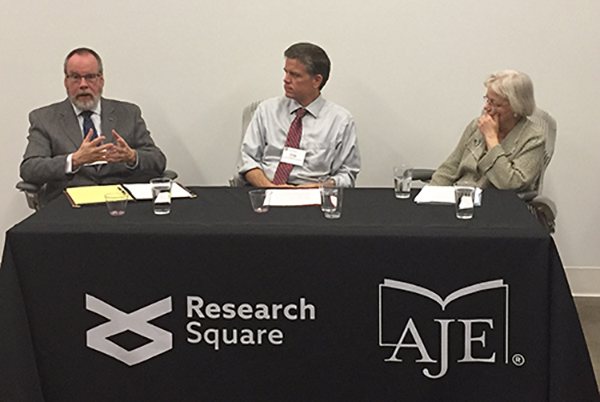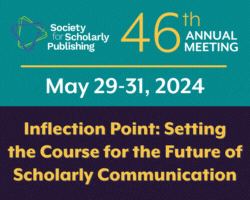There was little doubt that the audience of the first SSP regional event in Durham, NC, was in for an evening of spirited discussion when Sarah Michalak, Associate Provost and University Librarian at the University of North Carolina at Chapel Hill, offered her hypothesis for the future of academic publishing: a smart, database-like “soup” of articles detached from journal brands.
The October 8 panel discussion, moderated by Ben Mudrak of Research Square, also featured Greg Raschke, Associate Director for Collections and Scholarly Communication at North Carolina State University, and Kevin Smith, Director of Copyright and Scholarly Communication at Duke University. The panelists were asked to envision scholarly publishing 10 years from now.
Michalak predicts that the importance of the journal and its brand will decline in importance, replaced instead by a pool of articles with academic disciplines providing the organizational structure for vetting content and overseeing peer review. Audience members were quick to defend the roles of journals and publishers in taking raw material and making it readable (literally and conceptually), managing copyright, and creating metadata, among other things.
Smith’s vision for the future is one where open access is the norm, with library funding shifting from the support of collections and consumption to the creation of publications. He anticipates that the scholarly communication world will get more and more complicated as the number of business models increases. He also predicted that libraries will rely less on publishing as an industry and more on publishers’ expertise as service providers as publication is increasingly seen as another stage in the research cycle.
As he looked to the future of scholarly communications, Raschke suggested that the tenure process needed to change from the current predominant model, which rewards faculty members for structuring projects into distinct articles when, in fact, a book or longer article might be a better format. He believes that more publications like PLOS ONE, which offer high volume at a lower cost per unit, will continue to be preferred business models for libraries. He also sees a future for more boutique, university-based publishing models, more multimedia publications, and more accessible ways of communicating information that draw in the community at large, as in the case of translational medicine.
With around 50 attendees at the event, which was held at the offices of Research Square, the publishing (Auckland University Press, Duke University Press, Oxford University Press, University of North Carolina Press), university library (Duke, NC State, UNC-Chapel Hill, UNC-Greensboro), and partner (Dragonfly, Dryad, J&J Editorial, Research Square, Technica Editorial Services) communities were each well-represented. As the discussion went on, the importance of both publishers and libraries in making sense of a proliferating body of content emerged, as did the desire to carry the conversation forward at future regional events.
Regional programming is sponsored by Allen Press, Copyright Clearance Center, Digital Science and Dragonfly Sales and Marketing Consulting, Inc. Duke University Press and Research Square were local sponsors for the Durham event.




Join the Conversation
You must be logged in to post a comment.